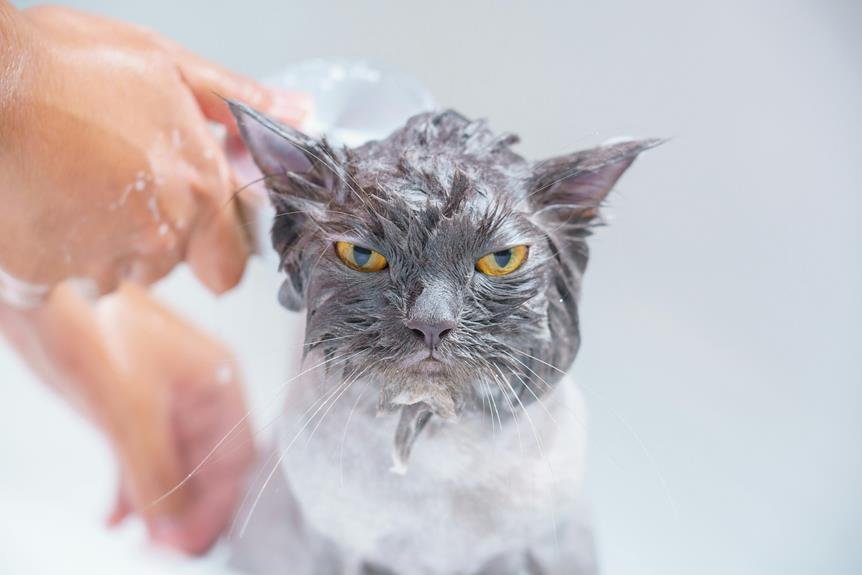
When determining how often to bathe your pet, consider factors like breed, activity level, and skin condition. For example, oily-coated breeds may need a bath every 4-6 weeks, while some like Siberian Huskies require only a few baths per year. Keep in mind that active dogs might need more frequent baths, and those with skin conditions may necessitate medicated baths. Each pet has unique needs, so it's essential to tailor your bathing schedule accordingly.
Frequency for Bathing Dogs
When determining how often to bathe your dog, consider factors such as their breed, activity level, and skin condition. Different breeds have different grooming needs. Dogs with oily coats, like Basset Hounds, might need bathing every 4-6 weeks to prevent a buildup of oils that can lead to skin issues.
On the other hand, breeds like Siberian Huskies, who naturally groom themselves like cats, may only need a few baths per year. Active dogs that love to play outside or get dirty may need more frequent baths, while less active dogs can go longer between baths.
Additionally, dogs with skin conditions may require special medicated baths as recommended by a veterinarian. Always use dog-specific shampoos and conditioners to avoid skin irritation. Remember, bathing too frequently can strip your dog's skin of natural oils, so find a balance that keeps your furry friend clean and healthy.
Bathing Schedule for Cats
Considering the grooming needs of different pets, now let's address the bathing schedule for cats. Cats are known for being meticulous self-groomers, and in most cases, they don't require frequent baths like dogs. Generally, cats are able to keep themselves clean by licking their fur. However, there are some instances when bathing your cat may be necessary.
For healthy indoor cats, you may only need to bathe them a few times a year or as needed. Cats with certain skin conditions or those who've gotten into something messy may require more frequent baths. It's important to observe your cat's behavior and coat condition to determine if a bath is necessary.
Remember that cats can be sensitive to water and bathing, so it's crucial to use cat-friendly products and ensure a calm environment during the bathing process. Regular grooming, including brushing your cat's coat and trimming their nails, can also help maintain their cleanliness between baths.
Bathing Guidelines for Small Pets
To ensure proper hygiene for your small pets, establish a bathing routine that aligns with their specific needs and characteristics. Small pets like guinea pigs, rabbits, and hamsters generally don't require frequent baths as they groom themselves regularly. In fact, bathing them too often can strip their skin of natural oils, leading to dryness and irritation.
For small pets that do need bathing, such as ferrets or certain breeds of small dogs, it's essential to use shampoos specifically formulated for their species. Always check with a veterinarian for recommendations on safe products and proper bathing techniques.
When bathing your small pet, ensure the water is lukewarm and at a shallow depth to prevent accidents. Gently massage the shampoo into their fur, avoiding their eyes and ears. Thoroughly rinse to remove all traces of shampoo, as leftover residue can cause skin irritation.
After bathing, make sure to dry them completely to prevent chilling. By following these guidelines, you can keep your small pets clean and healthy without causing them unnecessary stress.
Special Considerations for Exotic Pets
For exotic pets with unique care requirements, understanding their specific needs is vital to ensure their well-being and health. Exotic pets encompass a diverse range of animals, from reptiles like snakes and lizards to birds like parrots and even small mammals like sugar gliders. Each species has its own set of requirements when it comes to grooming and hygiene.
When caring for exotic pets, it's important to research and understand the bathing needs of your specific animal. Some exotic pets, like chinchillas, should never be bathed in water due to their dense fur and susceptibility to fungal infections. Instead, they require dust baths to maintain their coat's health. Birds, on the other hand, may benefit from regular misting to help keep their feathers clean and in good condition.
Consult with a veterinarian or a knowledgeable exotic pet specialist to determine the best bathing practices for your unique pet. Ensuring proper hygiene routines won't only keep your exotic pet looking its best but also contribute to its overall health and well-being.
Conclusion
Overall, the frequency of bathing your pet depends on their breed, coat type, and lifestyle. Remember to use pet-friendly shampoo and lukewarm water when bathing your furry friend.
Regular grooming and bathing can help keep your pet clean, healthy, and happy. If you're unsure about how often to bathe your pet, consult with your veterinarian for personalized recommendations.
Happy bathing!




